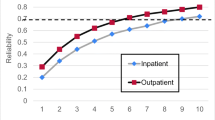Abstract
Objective
The authors contrasted physicians trained in both psychiatry and another specialty who continue to practice both specialties vs. those who practice only psychiatry, in terms of their training, academic profile, and practice setting.
Method
The authors analyzed survey responses from 132 doubly boarded physicians who vary in whether or not they continue to practice both specialties. Group results were compared using chi square, Fisher exact, and t tests.
Results
Of graduates of double-board programs, 79.2 % continue in dual practice. Other factors associated with continued combined practice were training in neurology–psychiatry, greater academic involvement, high motivation, practice in a non-public hospital setting, and demonstrated leadership capacity.
Conclusion
Double-board training programs have been successful in producing a group of clinicians committed to long-term combined medical–psychiatric practice, but this effect is stronger in psychiatry–neurology than in other types of combined practice. Future research should investigate other practice parameters that foster or impede integrated medical–psychiatric care.
Similar content being viewed by others
References
Stieble V, Schwartz CE. Physicians at the medicine/psychiatric interface: what do internists/psychiatrists do? Psychosom. 2001;42:377–81.
Felker B, Yazel JJ, Short D. Mortality and medical comorbidity among psychiatric patients: a review. Psychiatr Serv. 1996;47:1356–63.
Viron MJ, Stern TA. The impact of serious mental illness on health and healthcare. Psychosom. 2010;51:458–65.
Servis M. Combined family practice and psychiatry residency training: a 10-year appraisal. Acad Psychiatry. 2005;29:416–8.
Summergrad P, Silberman E, Price LL. Practice and career outcomes of double-boarded psychiatrists. Psychosom. 2011;52:537–43.
Rachal J, Lacy T, Warner C, et al. Characteristics of combined family practice-psychiatry residency programs. Academ Psychiatry. 2005;29:419–25.
Silberman EK. A survey of state and VA policies on psychiatrists as primary care providers. Psychiatr Serv. 1997;48:946–7.
Disclosure
Dr. Summergrad receives honoraria from CME Outfitters, Inc, for non-promotional speaking.
Author information
Authors and Affiliations
Corresponding author
Rights and permissions
About this article
Cite this article
Silberman, E., Summergrad, P. & Price, L. Parameters of Training, Academic Involvement, and Practice Setting Predictive of Retention in Combined Medical–Psychiatric Practice. Acad Psychiatry 38, 470–472 (2014). https://doi.org/10.1007/s40596-014-0111-1
Received:
Accepted:
Published:
Issue Date:
DOI: https://doi.org/10.1007/s40596-014-0111-1




